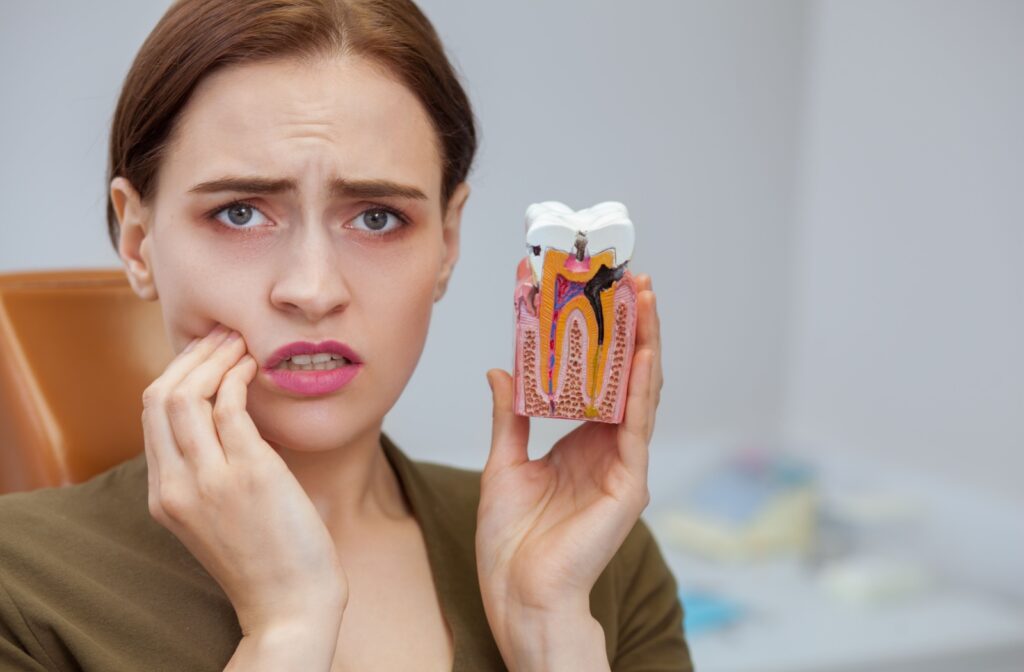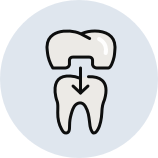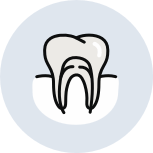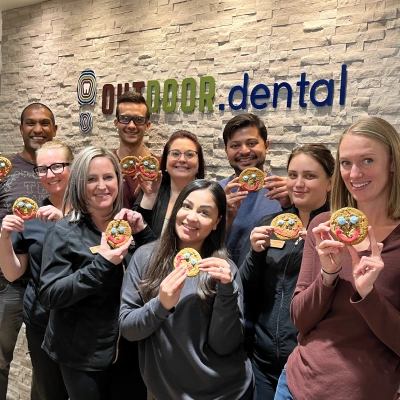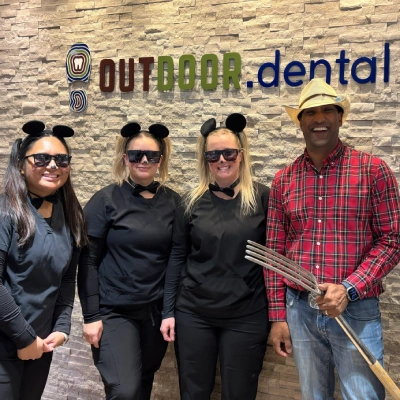A cavity, also known as dental caries or tooth decay, is a common dental problem that affects people of all ages. Cavities are caused by the breakdown of the hard tissues of the tooth due to acids produced by bacteria in the mouth.
Cavities often begin without any noticeable symptoms. However, as they progress, cavities may cause a range of uncomfortable sensations. Early signs include sensitivity to sweet, hot, or cold foods and drinks. As a cavity becomes more pronounced, it may cause persistent toothaches, which are often accompanied by sharp pain when biting or chewing.
In some cases, visible holes or pits may develop in the affected tooth. Left untreated, cavities can lead to severe discomfort and even infection.
Risk Factors for Cavities
Several factors can increase an individual’s risk of developing cavities, including:
- Poor oral hygiene: Inadequate brushing and flossing can lead to the accumulation of plaque on teeth, which can then release acids that attack tooth enamel.
- High sugar diet: Bacteria in the mouth feed on sugars from food and drinks, producing harmful acids that erode tooth enamel.
- Dry mouth: Saliva plays a crucial role in cleansing the mouth and neutralizing acid production. A dry mouth due to medications or health conditions can contribute to cavity formation.
- Acidic foods and drinks: Consuming acidic foods or drinks frequently can also weaken tooth enamel over time.
- Genetics: Some individuals may have a genetic predisposition to weakened enamel, making them more prone to developing cavities.
- Tooth location: Molars and premolars, which have deep grooves and pits on the chewing surfaces, are more susceptible to cavities.
- Age: As we age, our teeth may become more vulnerable to cavities due to wear and tear over time.
How to Prevent Cavities
The good news is that cavities are preventable. Here are some tips to help you maintain good oral health and keep your teeth cavity-free:
- Brush twice a day: Brush your teeth thoroughly at least twice a day with fluoride toothpaste to remove plaque and bacteria.
- Floss daily: Flossing helps remove food particles and plaque from between the teeth, where toothbrushes cannot reach.
- Limit sugary foods and drinks: Try to avoid or limit sugary snacks and beverages, especially between meals when saliva production is lower.
- Drink plenty of water: Water can help wash away food particles and stimulate saliva production, which aids in neutralizing acids in the mouth.
- Use fluoride toothpaste and mouthwash: Fluoride helps strengthen tooth enamel, making it more resistant to acid attacks. Using a fluoride mouthwash can also provide additional protection against cavities.
- Visit your dentist regularly: Regular dental check-ups are essential for early detection and treatment of any potential oral health issues, including cavities.
- Consider dental sealants: Sealants are thin plastic coatings applied to the chewing surfaces of back teeth to protect them from decay-causing bacteria.
Treatment for Cavities
Early diagnosis and treatment are crucial in preventing further damage and alleviating the discomfort caused by cavities. Dentists typically utilize a combination of X-rays and visual examinations to detect cavities effectively. X-rays allow them to see beneath the surface of the teeth, revealing decay that may not be visible to the naked eye.
The treatment options for cavities vary depending on the extent of the decay and the overall health of the tooth.
- Early stages: If decay is caught early on, it can often be treated with a simple filling. The decayed area of the tooth is removed and replaced with a filling material, such as composite resin or amalgam.
- Advanced stages: If the decay has progressed deeper into the tooth, more extensive treatment may be necessary. This could include a root canal procedure to remove damaged nerve tissue and seal off the root canal or, in severe cases, extraction of the affected tooth.
- Severe stages: In some cases, when a tooth has been severely damaged by decay, a dental crown or cap may be required. Crowns provide additional strength and protection, covering the entire tooth to restore its shape and function. Crowns are often made from materials such as porcelain, metal, or a combination of both, ensuring durability while maintaining a natural appearance.
Achieve & Maintain a Radiant Smile with Outdoor Dental
Preventing cavities is always better than treating them. Practicing good oral hygiene, including regular brushing and flossing, can significantly reduce the risk of developing cavities. Additionally, limiting sugary foods and drinks and visiting your dentist regularly for cleanings and check-ups can also help prevent cavities from forming.
If you do experience discomfort or suspect that you have a cavity, it’s essential to visit your dentist as soon as possible. Early detection and treatment can not only save you from further damage, but may also save you time and money in the long run.
At Outdoor Dental, our team of experienced dentists is committed to helping you maintain a healthy and beautiful smile. We offer a wide range of general and restorative treatments, including fillings, crowns, root canals, and extractions. Don’t let cavities ruin your oral health – schedule an appointment with us today for a cavity-free future!

